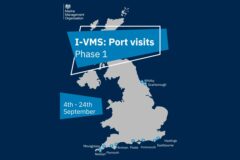First two commercially landed fish sold in Plymouth, as 2023 CHART fishery also gets underway
Defra Minister Mark Spencer welcomed the start of the two bluefin tuna programmes that began last week, with a successful start to the angling tag and release (CHART) programme coinciding with the first two commercially landed bluefin being sold on Plymouth market on successive days.
The UK has a total 65t share of the overall Atlantic bluefin tuna TAC of 40,570t, having agreed a UK share of 0.25% of the EU quota as part of the post-Brexit settlement.
Under the new commercial pilot project, 10 individual vessels have received 3.9t of quota each, under a scheme where applicants had to include details of how fish would be marketed to maximise their individual value, register with ICCAT and fish only with trolled lures.
A delay to the opening of the commercial season, originally scheduled for 1 August, saw a slow initial start, but several skippers with licences told FN that this was not an issue, as most fishermen preferred to wait for the fat content of the tuna to increase as they continue their summer feeding frenzy.
There are widespread reports of large numbers of mature fish feeding on small pelagics in the South West – ‘some real foam parties’, as one skipper put it, with many posting videos on social media of multiple fish feeding.
One of the licensed vessels, the Mevagissey-based Aquila skippered by Chris Gill, who we featured last week providing a training session organised by the South West Handline Fishermen’s Association (SWHFA) (Fishing News, 17 August, ‘Skippers briefed on bluefin techniques’), took two bluefin on his first day under the recreational tag and release scheme, the larger of the two estimated at over 400lb.
However, he and the other SWHFA member vessels licensed in the fishery are expected to delay commercial landings until fish quality is such that maximum prices for their landings in the lucrative sushi market can be achieved.
“We all want this to be a success,” one licensed skipper told FN, “but we need to get it right. The fish don’t only need careful spiking, bleeding, finning, gilling and gutting. There’s a minimum need for at least a pound of ice onboard for every pound of fish taken.
“Then we need to co-ordinate our fishing, to ensure that the market stays even. Given the amount of tuna we’re seeing, the marketing plan is going to be as important as the catching of the fish to maximise the value of the quotas that each boat has.”
Anthony Hills, who landed the first two fish on successive days on his vessel Labrax RX 136, told FN: “I’ve had three years as a tag and release skipper on CHART, fully trained by Cefas, to think about how to do this on my boat. I’ve adapted it specially, including two custom-made ice bags to ensure I can chill the fish rapidly, and a winch set up to maximise stability and safety whilst treating the fish with real care.
“I bled and cleaned the first fish as I would a quality bass. The second, I gave the whole treatment – spiked, bled, degilled, cleaned through the gill cavity and the vent, into the ice bag to prevent any squashing of the fillets. I am very keen for full feedback from the buyers to help us maximise quality and prices.”
Brixham fish merchant Ian Perkes, who bought the first two bluefin landed, said: “We’re also waiting for detailed feedback from the two different customers to whom we sent the two fish. There’s clearly a steep learning curve for everyone involved and lessons to be learned from these early fish.
“A huge issue that will impact this fishery is Brexit, and the post-Brexit trading rules and loss of electronic export certificates. We’re seeing huge difficulties with exporting fish through Calais right now, and no one is going to risk losing a bluefin at the EU border, however much interest there is for buying these fish.”
Welcoming the opening of the two fisheries, minister Mark Spencer said: “We’re committed to the sustainable management of Atlantic bluefin tuna, and today’s announcement will help deliver this while providing economic and social benefits to communities around our coast.
“I look forward to seeing the valuable research that this work will deliver, contributing hugely to developing a plan for how we use our quota in the future.”
This story was taken from the latest issue of Fishing News. For more up-to-date and in-depth reports on the UK and Irish commercial fishing sector, subscribe to Fishing News here or buy the latest single issue for just £3.50 here.
Sign up to Fishing News’ FREE e-newsletter here.






